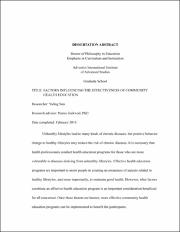| dc.description.abstract | Unhealthy lifestyles lead to many kinds of chronic diseases, but positive behavior change to healthy lifestyles may reduce the risk of chronic diseases. It is necessary that health professionals conduct health education programs for those who are more vulnerable to diseases deriving from unhealthy lifestyles. Effective health education programs are important to assist people in creating an awareness of aspects related to healthy lifestyles, and more importantly, to maintain good health. However, what factors constitute an effective health education program is an important consideration beneficial for all concerned. Once these factors are known, more effective community health education programs can be implemented to benefit the participants.
The primary purpose of this study was to identify the factors influencing the effectiveness of community health education as perceived by the participants of health education programs. After the review of literature, several important factors were identified, not all in the same studies. The factors that came out predominantly were social support, age, social economic status, culture, skilled health educators, educational strategies, communication skills, and a well-planned program. This study combined all these factors and attempted to find the most important factors for the effectiveness of community health education from the perspective of the participants of the programs.
A quantitative methodology in the form of correlational approach was utilized for the study. Data was collected from a total of 206 respondents who had attended community health education programs in 7 communities in the region of Cavite, Philippines. Multiple Regression, t-Test, and One-Way Analysis of Variance were used to analyze the data. As a result of this study, a predictive model was developed and presents 54.8% of variance in the factors influencing the effectiveness of community health education. Educational strategies, skilled health educators, age (50 years old & above vs. 10 to 29 years old), and religion (Adventist vs. Christian and Adventist vs. others) were significant predictors of the effectiveness of community health education. | en_US |

